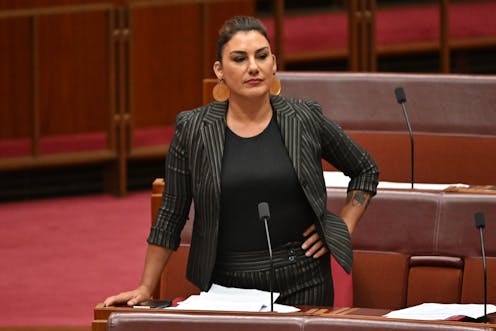
Senator Lidia Thorpe announced on Monday that she would be leaving the Greens. Thorpe had split with the Greens over the Indigenous Voice to parliament, which she opposes.
Thorpe was elected at the May 2022 election as a Victorian senator for a six-year term. Although she has left the Greens, she can remain a senator until her term expires in June 2028. If Thorpe resigns from the Senate, the Greens would select her replacement. But as she has resigned from the party but not the Senate, she can continue to sit on the crossbench.
This means Thorpe has resigned from the Greens over eight months after the May 2022 election and over seven months since her current six-year term began in July 2022. She still has nearly five-and-a-half years until her term expires.
The Senate has 72 state senators and four territory senators. Half of the state senators are up for election every three years, so those elected in 2019 will be up in 2025, and those elected in 2022 are up in 2028. All territory senators are tied to the three-year term of the House of Representatives.
In the Senate that was elected as a result of both the 2019 and 2022 elections, the Coalition held 32 of the 76 seats, Labor 26, the Greens 12, One Nation two, the Jacqui Lambie Network (JLN) two, David Pocock one and the UAP one.
Read more: Final Senate results: Labor, the Greens and David Pocock will have a majority of senators
Before Thorpe’s defection, Labor and the Greens held 38 of the 76 senators, and Labor only needed one more vote to pass legislation opposed by the Coalition that the Greens supported. Labor was able to get this vote from either the JLN or Pocock.
With Thorpe’s defection, the Greens are down to 11 senators, and Labor will need two other votes to pass legislation opposed by the Coalition that the Greens support. The best options for Labor are either the JLN or both Pocock and Thorpe.
Thorpe’s defection from the Greens over opposition to the Voice has very little support with Greens voters nationally. In a Newspoll that I covered Monday, Greens voters supported the Voice by an 81-10 margin.
The one way to cut short Thorpe’s term is for a double dissolution election to occur. This requires legislation passed by the House to be rejected or unacceptably amended twice by the Senate at least three months apart. At a double dissolution, all senators are elected at the same time. The last double dissolution was the July 2016 election.
Thorpe is not the first defector from an established party in the Senate, and probably won’t be the last. Cory Bernardi defected from the Liberals in February 2017, shortly after winning a six-year term at the 2016 election. Mal Colston defected from Labor in August 1996.
Adrian Beaumont does not work for, consult, own shares in or receive funding from any company or organization that would benefit from this article, and has disclosed no relevant affiliations beyond their academic appointment.
This article was originally published on The Conversation. Read the original article.







